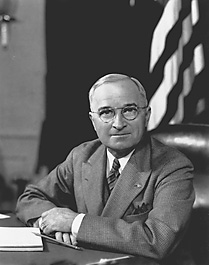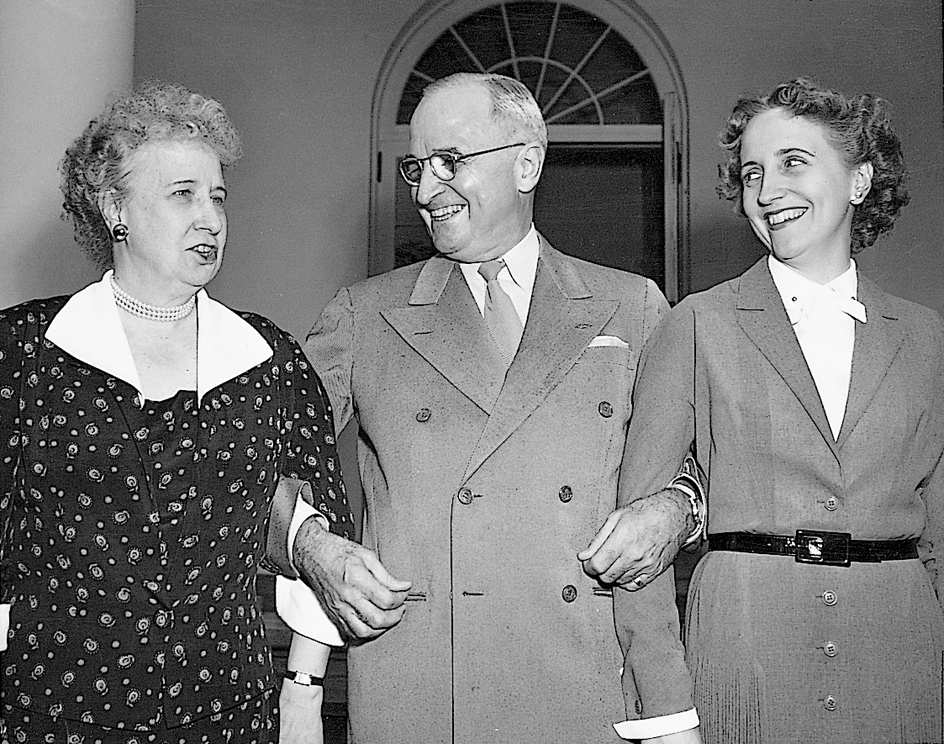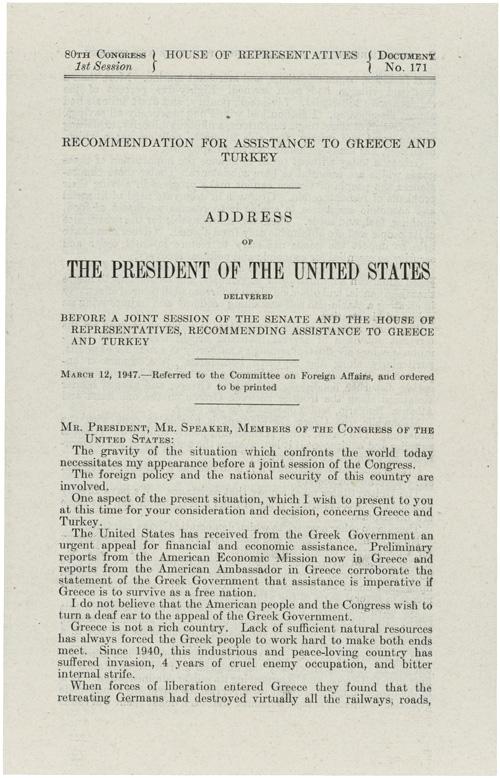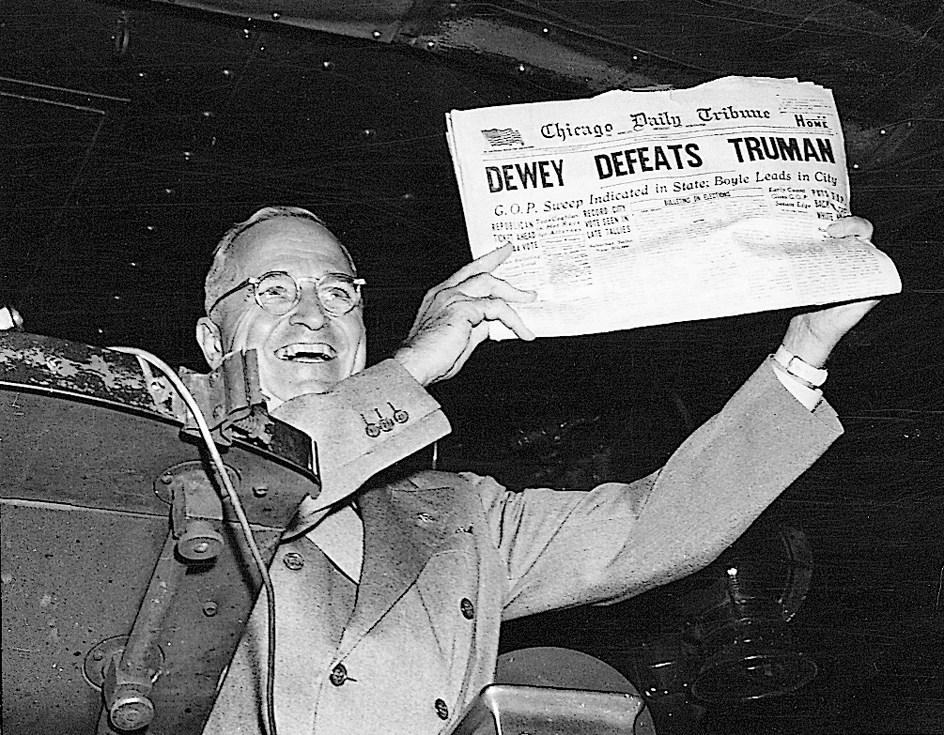Truman, Harry S. (1884-1972), became president at a critical moment in American history. President Franklin D. Roosevelt died on April 12, 1945. Truman, a Missouri Democrat, had been vice president for only 83 days. World War II (1939-1945) still had to be won. Plans to establish the United Nations had just started.

When Truman became president, he was known mainly for his work as chairman of a Senate investigating committee. The committee had saved millions of dollars in military contracts during the war. Truman met the challenges of his presidency with courage, determination, and imagination. During the first few weeks of his administration, the Allies won victory in Europe. Truman then made one of the most difficult decisions ever considered by one human being. He decided to use the powerful new atomic bomb against Japan to end World War II.
Truman faced other problems throughout his years in the White House. The United States had to reorganize its economy from a wartime to a peacetime basis. Many war-torn countries needed reliefs. Western nations faced Communist aggression in a Cold War that divided the world. To meet these challenges, Truman’s administration created some far-reaching programs. They included the Truman Doctrine, the Marshall Plan, the Point Four Program, and the North Atlantic Treaty Organization (NATO).
Communist forces from North Korea invaded South Korea in 1950. Truman faced another grave decision. If he sent armed forces to intervene without waiting for United Nations action, he risked war with the Soviet Union. The Soviet Union was a Communist ally of North Korea. But if he delayed, help might be too late. Within two days, the president ordered American armed forces to aid South Korea. His action preserved South Korean independence. It also demonstrated that the United States would support and defend its allies.
Truman’s strong personality and fighting spirit won him loyal friends and bitter enemies. He was blunt and outspoken. He often lashed out at those who opposed him. His opponents said he was undignified. His friends loved him as a straightforward man of the people.
Early life
Childhood.
Harry S. Truman was born in Lamar, Missouri, on May 8, 1884. He was the oldest of the three children of John Anderson Truman and Martha Ellen Young Truman. His parents named him Harry in honor of his uncle, Harrison Young. They chose the middle initial “S.” But they gave him no middle name. They intended that both his grandfathers, Solomon Young and Anderson Shippe Truman, could claim that he was named for them.
When Harry was 6 years old, his family moved from a farm near Grandview, Missouri, to Independence, Missouri. Harry went to elementary school and high school in Independence. The boy was nearsighted. He began wearing glasses when he was 8. “I was so carefully cautioned by the eye doctor about breaking my glasses and injuring my eyes,” he later wrote, “that I was afraid to join in the rough-and-tumble games in the schoolyard and back lot. My time was spent in reading, and by the time I was 13 or 14 years old I had read all the books in the Independence Public Library and our old Bible three times through.” During the summers, Harry, his brother Vivian (1886-1965), and his sister Mary Jane (1889-1978) visited their grandparents’ farm near Grandview. At the age of 18, Harry joined the Baptist Church.
First jobs.
Truman wanted to go to the United States Military Academy at West Point. But his vision was not good enough to meet Army standards. After graduating from high school in 1901, Harry briefly attended business school in Kansas City, Missouri. He also worked for a short time in the mailing room of the Kansas City Star. He then took a job as a timekeeper for a construction crew of the Atchison, Topeka and Santa Fe Railway Company. The company is now part of the Burlington Northern Santa Fe Corporation. His next employment was as a clerk and later as a bookkeeper in two Kansas City banks. He moved to Grandview in 1906. There, with his father, he operated the family farm. He worked on the farm until 1917.
Soldier.
Truman was a member of the Missouri National Guard from 1905 to 1911. The United States entered World War I in 1917. Truman helped organize a field artillery regiment that was attached to the 35th Division. He became a lieutenant. Truman was sent to France early in 1918. There, as a captain, he commanded an artillery battery. His battery fought in the Vosges, Meuse-Argonne, and Sommedieu campaigns. Truman was honorably discharged in 1919. He joined the Army reserves as a major. He later rose to colonel.
Truman’s family.
Six weeks after he returned home, on June 28, 1919, Truman married Elizabeth “Bess” Virginia Wallace (1885-1982). The couple were childhood sweethearts. They had met at Sunday school when they were children. They had one child, Mary Margaret (1924-2008), whom they called Margaret. She was a concert soprano, actress, and broadcaster for several years. She later became an author of best-selling detective stories. 
Businessman.
Before World War I, Truman had lost money in mining and oil investments. In 1919, he and his friend Eddie Jacobson invested their savings in a men’s clothing store in Kansas City. They worked hard. They kept the store open from 8 a.m. to 9 p.m. But the business failed during a recession that began in 1921. Truman worked about 15 years to pay the store debts.
Political career
Discouraged by the failure of the store, Truman decided to seek a career in politics. He received help from “Big Tom” Pendergast. Pendergast was the Democratic Party boss of Kansas City. Pendergast’s nephew had known and admired Truman in the Army. Pendergast led one of the strongest political machines in the United States. He decided that Truman could win votes because of his farm background, his war record, and his friendly personality.
County judge.
Pendergast supported Truman in his campaign for election as county judge of Jackson County. This post in Missouri resembled that of county commissioner in other states. Truman won the election. He served from 1922 to 1924. He lost the 1924 election because of a split in local Democratic forces. Truman attended the Kansas City School of Law during the mid-1920’s. But he did not obtain a degree. He served as presiding county judge from 1926 to 1934. The Pendergast machine was dishonest. But Truman won a reputation for honesty and efficiency. He supervised new projects financed by $14 million in tax funds and bond issues.
U.S. senator.
In 1934, Truman was elected to the United States Senate. He again won with Pendergast’s support. As a member of the Senate Interstate Commerce Committee, Truman directed an investigation of railroad finances. His staff found damaging evidence about many of Truman’s friends in Missouri. But he ordered the investigation completed. A major result was the Transportation Act of 1940. The new law regulated railroad financing. Also during this time, a government study of the Pendergast political machine disclosed vote frauds and shady financial dealings. Pendergast pleaded guilty to income tax evasion. He and many of his followers were sent to prison. The scandals did not touch Truman. But he refused to disclaim Pendergast. In 1940, Truman won reelection to the Senate.
The Truman Committee.
In 1940, the United States was not formally involved in World War II. But the nation’s defense spending had risen to huge sums. Truman realized that the defense effort created many opportunities for waste and corruption. He remembered that many committees had investigated military spending after World War I. But after the war, they were powerless to recover wasted funds. Truman urged the Senate to set up a committee to investigate defense spending as it occurred. Early in 1941, the Senate established the Committee to Investigate the National Defense Program. Truman was named chairman. The group soon became known as the Truman Committee. The committee uncovered waste and inefficiency. It saved the government about $15 billion. It also speeded war production.
Vice president.
In 1944, many Democratic leaders believed that President Roosevelt would not live through a fourth term in the White House. They realized that the man they chose for vice president would probably succeed to the presidency.
The contest for the vice presidential nomination almost split the party. Many liberals supported Vice President Henry A. Wallace for renomination. Others favored Supreme Court Justice William O. Douglas. Southern conservatives preferred James F. Byrnes, a former justice of the court. Roosevelt refused to name a preference. Robert E. Hannegan of St. Louis was a Truman supporter and chairman of the party’s national committee. Hannegan backed Truman as a compromise candidate. Truman had a national reputation as a result of his committee investigations. He also had a good voting record as a senator. Roosevelt was willing to accept him. Byrnes withdrew. The delegates nominated Truman on the second ballot.
Roosevelt and Truman easily defeated their Republican opponents, Governor Thomas E. Dewey of New York and Governor John W. Bricker of Ohio (see Roosevelt, Franklin Delano (Election of 1944)). As vice president, Truman presided over the Senate. During the 83 days he held this office, he worked hard to obtain Senate approval of Henry A. Wallace as secretary of commerce. He also broke a Senate tie by voting against an amendment prohibiting postwar delivery of goods through the Lend-Lease program.
First administration (1945-1949)
Late in the afternoon of April 12, 1945, Truman was summoned to the White House by telephone. He was taken to Eleanor Roosevelt‘s study. She stepped forward to meet him. “Harry,” she said quietly, “the president is dead.” Truman’s first words were: “Is there anything I can do for you?” Mrs. Roosevelt replied: “Is there anything we can do for you? For you are the one in trouble now.”
At 7:09 p.m., Truman took the oath of office as president. The next day, while talking to White House newsmen, he said: “Boys, if you ever pray, pray for me now. I don’t know whether you fellows ever had a load of hay fall on you, but when they told me yesterday what had happened, I felt like the moon, the stars, and all the planets had fallen on me.”
The end of World War II.
When Truman became president, Allied armies were winning the war in Germany. They were preparing to invade Japan. Events moved swiftly. Thirteen days after Truman took office, the first United Nations conference met in San Francisco (see San Francisco Conference). Then, on May 7, Germany surrendered. Truman proclaimed May 8 as V-E Day (Victory in Europe Day). It was his 61st birthday.
In July, Truman traveled to Potsdam, Germany, to confer with Prime Minister Winston Churchill of the United Kingdom and Premier Joseph Stalin of the Soviet Union (see Potsdam Conference). While in Potsdam, the president received secret word that American scientists had successfully tested an atomic bomb. On his way home, Truman ordered American fliers to drop an atomic bomb on Japan. The first bomb fell on the city of Hiroshima on August 6. Three days later, a second atomic bomb was dropped on Nagasaki. Truman had believed the United States would have to invade Japan to get that country’s leaders to surrender. He and others said dropping the bombs would help end the war more quickly. The bombing thus saved hundreds of thousands of lives. Japan agreed to end the war on August 14. It formally surrendered on September 2. See Nuclear weapon (World War II); World War II (The atomic bomb). Loading the player...
Harry Truman on Hiroshima
Domestic program.
Truman wanted to extend Roosevelt’s “New Deal” policies. He drew up a program for reconstructing postwar America. The president presented it to Congress in September 1945. His requests included extensive authority over the economy in the conversion from wartime to peacetime. He also asked for national health insurance and a permanent Fair Employment Practices Commission (FEPC) to protect minority rights. In addition, Truman proposed government aid for scientific research and public power projects on the Arkansas, Columbia, and Missouri rivers.
Crippling labor disputes and shortages of consumer goods helped the Republicans gain control of Congress in the 1946 elections. The Republicans blocked most of Truman’s domestic measures. Congress did approve Truman’s plan to unify the armed forces under a single secretary of defense (see Defense, Department of). A commission was established to study ways of improving government efficiency. Truman named former President Herbert Hoover to head it (see Hoover Commission). In 1947, after a long fight, Congress passed the Labor-Management Relations Act, or Taft-Hartley Act, over the president’s veto. The act placed numerous restrictions on labor unions.
The Truman Doctrine.
Soon after World War II, the Cold War developed between the Soviet Union and its former allies. The Communists gained control over Eastern Europe. Truman realized that the United States would have to lead in the fight for freedom. The country would have to spend as much as necessary to strengthen its war-torn allies. In 1946, Congress approved a $3,750,000,000 loan to the United Kingdom. Then, on March 12, 1947, Truman announced a doctrine of international resistance to Communist aggression. The Truman Doctrine guaranteed American aid to free nations resisting Communist propaganda or sabotage. 
The Marshall Plan
was outlined by Secretary of State George C. Marshall in 1947. The Marshall Plan extended the Truman Doctrine. It proposed that the war-damaged nations of Europe join in a program of mutual aid for economic recovery. They would be assisted by grants from the United States. Communist nations rejected the plan. But 18 other countries accepted it.
Election of 1948
seemed certain to bring victory to the Republicans. United and confident, they faced a divided Democratic Party. The Democratic National Convention nominated Truman on the first ballot. The convention picked Senator Alben W. Barkley of Kentucky for vice president. A group of liberal Democrats had already left the party and formed the Progressive Party. The Progressives nominated former Vice President Wallace for president. Another group organized the Dixiecrat Party. The party was made up of Southern Democrats who opposed a strong civil rights program. They nominated Strom Thurmond, then governor of South Carolina. The Republicans again nominated Dewey for president. Governor Earl Warren of California was Dewey’s running mate.

Every public opinion poll predicted that Dewey would win a landslide victory. But, with fighting spirit, Truman made the experts look ridiculous. He traveled 31,000 miles (49,900 kilometers) by train in a “whistle-stop” campaign. He made more than 350 speeches. He attacked what he termed the “do nothing” Republican Congress. He called it “the worst in my memory.” Truman received a warm response with his simple language, earthy humor, and pluck. He also appealed to the groups that had supported Franklin D. Roosevelt. These groups included labor, farmers, liberals, minorities, and many middle-class consumers. In one of the biggest upsets in political history, Truman won 28 states. Dewey won 16 and Thurmond, 4. Truman won with less than 50 percent of the total popular vote.
Life in the White House.
Early every day—often as early as 5:30 a.m.—Truman arose and went for a brisk walk. He was always accompanied by Secret Service agents and members of the media. At the White House, Truman often played the piano for visitors. He particularly enjoyed the music of the Polish-born composer Frédéric Chopin and the Austrian composer Wolfgang Amadeus Mozart. The Trumans spent most evenings in a family living room upstairs.
The structural part of the White House had become weak. Engineers had to make repairs. The work began late in 1948. The Trumans moved to Blair House, a historic mansion on Pennsylvania Avenue. They lived there until March 1952.
On Nov. 1, 1950, two Puerto Rican nationalists tried to invade Blair House and assassinate the president. They killed one Secret Service guard and wounded another. One of the gunmen was killed. The other was captured. Truman commented that “A president has to expect those things.” He kept all his appointments that day. He took his usual walk the next morning.
Second administration (1949-1953)
Foreign affairs.
In the spring of 1949, the United States, Canada, the United Kingdom, France, and eight other nations signed the North Atlantic Treaty. The 12 nations thus formed the North Atlantic Treaty Organization (NATO). They agreed that an attack on one member would be considered an attack on all. Other countries later joined NATO. The NATO members helped group their armed forces to defend Western Europe. General Dwight D. Eisenhower served as the first supreme commander of NATO forces.
In his inaugural address, Truman called for “a bold new program for making the benefits of our scientific advances and industrial progress available for the improvement and growth of underdeveloped areas.” In 1950, Congress approved $35 million for the first part of this Point Four Program. Late in 1951, Truman asked Congress to set up a new foreign aid program for Communist-threatened countries in Southeast Asia. Congress established the Mutual Security Administration to strengthen military defenses in many countries. Western Europe had recovered economically from the war. For that reason, Truman changed the emphasis of foreign aid from economic help to mutual security. He believed that if the nation’s allies were strong, America would be strengthened, too.
The Korean War
began on June 25, 1950. Communist forces from North Korea invaded South Korea. The United Nations demanded that North Korea withdraw. Truman decided to intervene to save South Korea’s independence. On June 27, he announced that he had sent U.S. planes and ships to help South Korea. Congress cheered the announcement. That same day, the UN approved sending troops of other nations to join South Korean and American units. Truman ordered ground forces to South Korea on June 30. He later said that sending U.S. troops to South Korea was the hardest decision of his political career. By doing so, he risked starting World War III.
General Douglas MacArthur commanded all UN forces in Korea. His troops brought most of Korea under UN control by October 1950. But later that month, Chinese Communist troops joined the North Koreans. Truman recognized the urgency of the situation and put the United States on a semiwar basis. MacArthur wanted to attack Chinese Communist bases in Manchuria. But Truman believed that the fighting must be confined to Korea. He thought it vital that the conflict not spread into a global war. MacArthur made several public statements criticizing this policy. In April 1951, Truman dismissed MacArthur. The dismissal created a nationwide furor. See Korean War.
Problems at home.
The voters had elected a Democratic Congress in 1948. It soon proved almost as uncooperative in domestic affairs as the preceding Republican Congress had been. Truman waged a reform program, which he called the “Fair Deal.” “Every segment of our population and every individual has a right to expect from our government a fair deal,” he declared. The program included civil rights legislation and repeal of the Taft-Hartley Act. Truman proposed a new farm program stressing high farm income and low consumer prices. The Fair Deal also included federal aid to education, a federal housing program, and increases in the Social Security program. Southern Democrats joined conservative Republicans to defeat most of the president’s domestic proposals. The Democratic Party lost strength in the 1950 congressional elections.
Charges of Communist infiltration into the federal government added to the president’s concerns. Truman set up a federal board to investigate the loyalty of government employees. The Department of Justice prosecuted leaders of the American Communist Party. A House committee investigated charges that Communists worked for the Department of State. The trials of Alger Hiss and Ethel and Julius Rosenberg revealed that spies had stolen secret information and given it to Soviet agents. Senator Joseph R. McCarthy of Wisconsin also accused the Department of State of employing Communists. Truman rejected McCarthy’s charges. They were never proved.
Campaign of 1952.
On March 29, 1952, Truman announced that he would not seek reelection. “I have served my country long, and I think efficiently and honestly,” he said. “I do not feel that it is my duty to spend another four years in the White House.” Instead, he campaigned for the Democratic candidate, Governor Adlai E. Stevenson of Illinois. Stevenson lost to Dwight D. Eisenhower.
Elder statesman
Truman left office on Jan. 20, 1953. He retired to his home in Independence. He wrote two volumes of memoirs, Year of Decisions in 1955 and Years of Trial and Hope in 1956. Truman also continued his interest in politics and in the Democratic Party.
After Truman left the White House, his friends collected funds to build the Harry S. Truman Library in Independence. The library holds Truman’s papers and souvenirs. It opened in 1957.
Truman became ill late in 1972. He entered the hospital on December 5 with severe lung congestion. He died on December 26. He was buried in Independence in the Truman Library courtyard.
